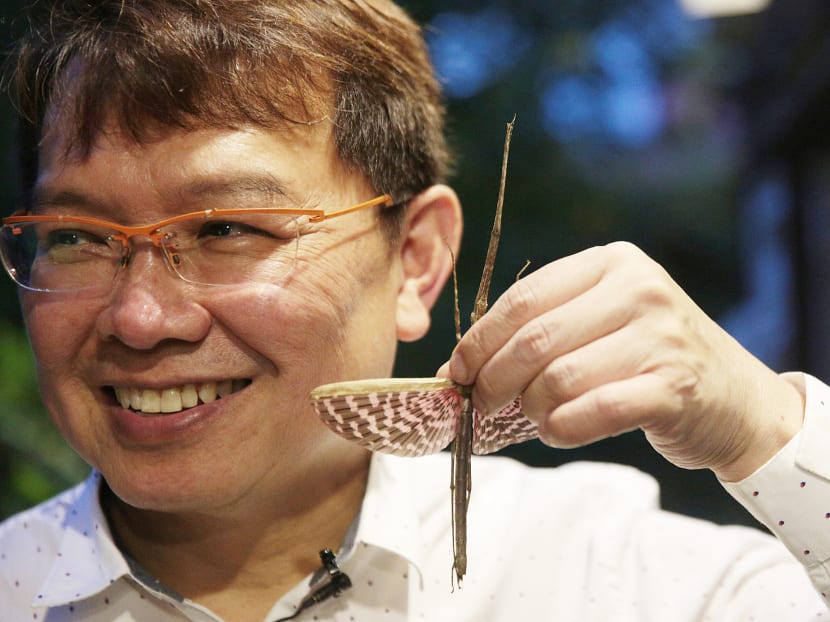The Big Read: Droppings boiled into tea sparked his interest on stick insects

Stick insect expert Dr Francis Seow-Choen with the Diesbachia tamyris, one of the stick insects he keeps at his home for study. Photo: Jason Quah
SINGAPORE — He kept rabbits, hamsters and cats as a young boy, but it is stick insects that he finds most fascinating to this day.
When he was in kindergarten, Dr Francis Seow-Choen found out about these insects because people in villages were keeping them to collect their droppings in order to boil tea for medicinal purposes. His mother managed to get some stick insects from the meat seller in the market and his fascination for them grew as he kept them.
“They’re beautiful, they’re harmless, they come in a variety of fashion — not just sticks but also leaves,” Dr Seow, 59, said. “They don’t have poison, don’t bite people, don’t spread Zika (virus),” the top colorectal surgeon in private practice added.
When threatened, stick insects play dead, camouflage themselves, or drop their legs (auto-amputate), he explained.
Dr Seow wanted to pursue veterinary surgery in university, but was told by the Public Service Commission interview panel to study something else because there were no cows or sheep in Singapore that required care. It was only after he became a doctor and returned from surgical training in London that he renewed his interest in stick insects.
There was little he could find about them in books and the library. When he contacted the National University of Singapore zoology department, staff members encouraged him to study them.
From 1989, he built up a formidable body of knowledge on the insects — also called phasmids — and has written four books on them so far. The latest, launched this month, is titled A Taxonomic Guide to the Stick Insects of Borneo, the result of his explorations and work over two decades.
Among 337 species featured are 52 new ones, classified under 15 new genera, described by him.
When he can find time out of his packed work schedule to head overseas, Dr Seow would venture out to forested areas at seven or eight at night with a hand torch, and stay out until five in the morning. “Because if I’m there and it takes a long time to get there, I don’t want to waste any time,” he said.
Just as challenging was the need to check with museums for old specimens, to avoid re-describing species, and translating old books that had described species in other languages. The science of naming organisms, or taxonomy, was “fraught with minefields” and the work was “much more difficult than writing a medical paper”, he said.
On his interest, Dr Seow — who added a hyphen between his surname and first name to keep it intact and minimise confusion when in London and after he began writing scientific papers — said: “It’s relaxing in that it’s something you enjoy. Insects don’t sue you or complain to you. Of course, it’s stressful if you’re (on a trip) looking for things and you don’t find anything new.”
He keeps some stick insects in the compound of his home for studies on breeding patterns and eggs, for example. Dr Seow is also discussing another more comprehensive survey of stick insects in Singapore with the authorities.
He estimates that there are about 52 species here, potentially more.
Both generalists and specialists have a role in getting the public more interested in nature, he said. People kill animals such as snakes because they don’t understand them and don’t understand what the loss of a single species means to Singapore or to ecology, he said.
“In life, we can be generalists and know a bit about everything, which I think is good. But I think it’s even better to know everything about a few things. Then, you are the expert and can contribute more to science and also to the world and to nature in general,” he said.









